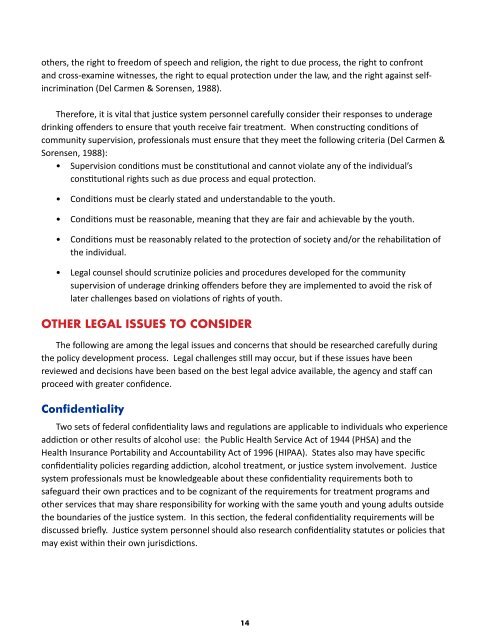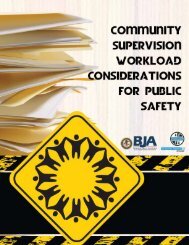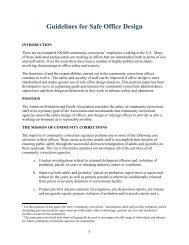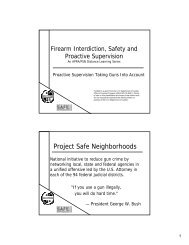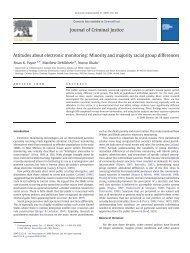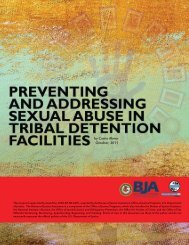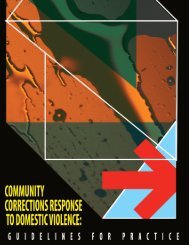Intervention Principles and Practice Guidelines for - Underage ...
Intervention Principles and Practice Guidelines for - Underage ...
Intervention Principles and Practice Guidelines for - Underage ...
You also want an ePaper? Increase the reach of your titles
YUMPU automatically turns print PDFs into web optimized ePapers that Google loves.
others, the right to freedom of speech <strong>and</strong> religion, the right to due process, the right to confront<br />
<strong>and</strong> cross-examine witnesses, the right to equal protection under the law, <strong>and</strong> the right against selfincrimination<br />
(Del Carmen & Sorensen, 1988).<br />
There<strong>for</strong>e, it is vital that justice system personnel carefully consider their responses to underage<br />
drinking offenders to ensure that youth receive fair treatment. When constructing conditions of<br />
community supervision, professionals must ensure that they meet the following criteria (Del Carmen &<br />
Sorensen, 1988):<br />
• Supervision conditions must be constitutional <strong>and</strong> cannot violate any of the individual’s<br />
constitutional rights such as due process <strong>and</strong> equal protection.<br />
• Conditions must be clearly stated <strong>and</strong> underst<strong>and</strong>able to the youth.<br />
• Conditions must be reasonable, meaning that they are fair <strong>and</strong> achievable by the youth.<br />
• Conditions must be reasonably related to the protection of society <strong>and</strong>/or the rehabilitation of<br />
the individual.<br />
• Legal counsel should scrutinize policies <strong>and</strong> procedures developed <strong>for</strong> the community<br />
supervision of underage drinking offenders be<strong>for</strong>e they are implemented to avoid the risk of<br />
later challenges based on violations of rights of youth.<br />
Other Legal Issues to Consider<br />
The following are among the legal issues <strong>and</strong> concerns that should be researched carefully during<br />
the policy development process. Legal challenges still may occur, but if these issues have been<br />
reviewed <strong>and</strong> decisions have been based on the best legal advice available, the agency <strong>and</strong> staff can<br />
proceed with greater confidence.<br />
Confidentiality<br />
Two sets of federal confidentiality laws <strong>and</strong> regulations are applicable to individuals who experience<br />
addiction or other results of alcohol use: the Public Health Service Act of 1944 (PHSA) <strong>and</strong> the<br />
Health Insurance Portability <strong>and</strong> Accountability Act of 1996 (HIPAA). States also may have specific<br />
confidentiality policies regarding addiction, alcohol treatment, or justice system involvement. Justice<br />
system professionals must be knowledgeable about these confidentiality requirements both to<br />
safeguard their own practices <strong>and</strong> to be cognizant of the requirements <strong>for</strong> treatment programs <strong>and</strong><br />
other services that may share responsibility <strong>for</strong> working with the same youth <strong>and</strong> young adults outside<br />
the boundaries of the justice system. In this section, the federal confidentiality requirements will be<br />
discussed briefly. Justice system personnel should also research confidentiality statutes or policies that<br />
may exist within their own jurisdictions.<br />
14


